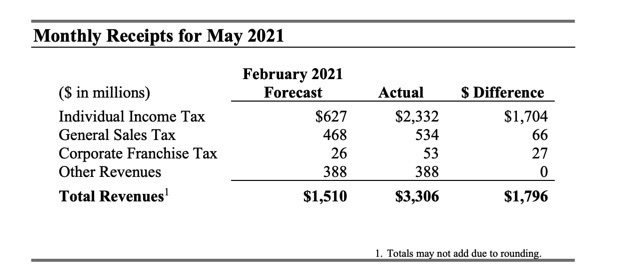Minnesota’s growing surplus should open the door for future tax reform
The Minnesota Management and Budget released the newest revenue report review. And from the look of things, Minnesota’s surplus for the fiscal year ending July is up by $1.8 billion.
Net general fund revenues totaled $3.306 billion in May, $1.796 billion (119.0 percent) more than projected. Net receipts from individual income, sales, and corporate taxes for the month exceeded the forecast, while other revenues matched the forecast. Normally, most tax year 2020 individual income tax payments would have been made in April, however, this year taxpayers were allowed to delay final and extension payments until May 17. The filing delay contributed to the income tax variance for the month of May. For fiscal year 2021, year to date receipts are now $23.113 billion, $2.170 billion (10.4 percent) more than projected

This is a trend that has been observed in numerous other states as well. Wisconsin, for example, has seen its projected budget surplus for the 2021-2023 three-year period grow by $4.4 billion. This largely points to the fact that states have faced similar trends –– job losses were concentrated among low-paying jobs meaning very little disruption in income tax revenues; federal stimulus, vaccines, and reopening plans have increased economic activity.
People are spending more than anticipated, federal funds continue to flow into the state and the economy is reopening as vaccination rates climb. Sales and corporate tax revenue were up last month, although the bulk of the surplus revenue came from individual income taxes.
Currently, the special legislative session has just started, and Minnesota legislatures will be hashing out the specific details of the $52 billion budget that was agreed on in the regular session. The timing of the surplus means it won’t be in consideration for the budget currently under discussion.
But this surplus should also open the door for future tax reform. Governor Walz and other lawmakers spent the entire session advocating for higher taxes on (rich) Minnesotans, yet our revenue outcomes have proved those tax hikes unnecessary. As we have shown in our report, tax revenues are rarely a function of tax rates, but rather a function of economic growth.
While in a sense the increase in economic activity has been partially propped up by federal spending, a point remains to be made that policies geared towards increasing income in Minnesota would have a higher impact on revenue than raising tax rates.
And the fact that most of the increase in the surplus has come from higher than expected income tax revenues is a testament to our high and progressive income tax rates. The people of Minnesota and the Minnesota economy would simply benefit from Minnesotans keeping more of their money in their pockets.